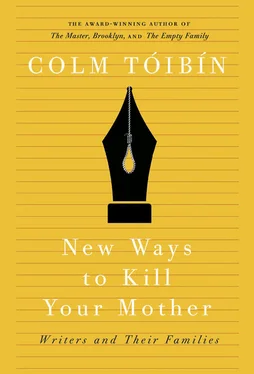In his first novel, Go Tell It on the Mountain , published in 1953, Baldwin wrote with remarkable eloquence about the power of prayer and preaching for an otherwise powerless community, the sense of time spent in church as a time filled with soaring possibilities in contrast to the bitter world outside. It was as though that very bitterness offered the congregation a unique insight into the suffering of Christ and made the congregation for that time of prayer and preaching a chosen people whose spiritual exaltation, in all its fiery rhetoric and colourful abandon, could never be experienced by white people.
Baldwin matched his novel with an essay, ‘Down at the Cross’, published in 1962, where he wrote about his own conversion as an adolescent filled with doubts and fears and ambitions and a sharp sense of exclusion:
One moment I was on my feet, singing and clapping and, at the same time, working out in my head the plot of a play I was working on then; the next moment, with no transition, no sensation of falling, I was on my back, with the lights beating down into my face and all the vertical saints above me.
Baldwin emphasized that because black suffering had been transformed so secretly and so completely by black religious leaders into spiritual suffering, what happened in black churches would have to be fully understood, dramatized and explained before any solution would be possible. His first novel and his essay ‘Down at the Cross’ sought to let white America into the secret that was Sunday for the black community:
The church was very exciting. It took a long time for me to disengage myself from this excitement, and on the blindest, most visceral level, I really never have, and never will. There is no music like that music, no drama like the drama of the saints rejoicing, the sinners moaning, the tambourines racing, and all those voices coming together and crying holy unto the Lord. There is still, for me, no pathos quite like the pathos of those multicolored, worn, somehow triumphant and transfigured faces, speaking from the depths of a visible, tangible, continuing despair of the goodness of the Lord… Nothing that has happened to me since equals the power and the glory that I sometimes felt when, in the middle of a sermon, I knew that I was somehow, by some miracle, really carrying, as they say, ‘the Word’ — when the church and I were one.
Out of oppression then came a freedom that only the church could offer and that gave the church a special, defining power for black communities, which was both beyond politics and deeply political, a power the Catholic Church in Poland and Ireland would also have. ‘Perhaps we were, all of us,’ Baldwin wrote, ‘bound together by the nature of our oppression, the specific and peculiar complex of risks we had to run; if so, within these limits we sometimes achieved with each other a freedom that was close to love.’
In Dreams from My Father , Barack Obama described finding religion in Chicago, hearing about the history of the black church in America, the ‘history of slave religion… Africans who, newly landed on hostile shores, had sat circled around a fire mixing newfound myths with ancient rhythms, their songs becoming a vessel for those most radical of ideas — survival, and freedom, and hope’. He described attending a sermon given by the Reverend Jeremiah Wright, pastor of Trinity United Church of Christ in Chicago:
People began to shout, to rise from their seats and clap and cry out, a forceful wind carrying the reverend’s voice up into the rafters. As I watched and listened from my seat, I began to hear all the notes from the past three years swirl about me… The desire to let go, the desire to escape, the desire to give oneself up to a God that could somehow put a floor on despair.
The sermons heard in those churches preached not only about eternal life and the ethereal life of the soul, but about the sufferings of the soul on this earth, in this America, and the emotions to which this suffering gave rise, including despair and anger. In March 2008 Obama would try to explain that anger as one of the many essential parts of the religious services that black people had been attending all of their lives, the services that Baldwin had dramatized and described, and that the white majority had been excluded from. ‘The fact,’ Obama said,
that so many people are surprised to hear that anger in some of Reverend Wright’s sermons simply reminds us of the old truism that the most segregated hour in American life occurs on Sunday morning. That anger is not always productive; indeed, all too often it distracts attention from solving real problems; it keeps us from squarely facing our own complicity in our condition, and prevents the African-American community from forging the alliances it needs to bring about real change. But the anger is real; it is powerful; and to simply wish it away, to condemn it without understanding its roots, only serves to widen the chasm of misunderstanding that exists between the races.
Obama’s church was like the one that Baldwin described in Go Tell It on the Mountain , a place where ‘all the men seemed mighty’, that ‘rocked with the Power of God’, that offered the community a sort of nobility and unity and sense of transcendence not available elsewhere. ‘That has been my experience at Trinity,’ Obama said in March 2008.
Like other predominantly black churches across the country, Trinity embodies the black community in its entirety — the doctor and the welfare mom, the model student and the former gang-banger. Like other black churches, Trinity’s services are full of raucous laughter and sometimes bawdy humor. They are full of dancing, clapping, screaming and shouting that may seem jarring to the untrained ear. The church contains in full the kindness and cruelty, the fierce intelligence and the shocking ignorance, the struggles and successes, the love and yes, the bitterness and bias that make up the black experience in America.
Baldwin was a child preacher, and that tone never left his system, just as it is part of the rhetoric he came to use later on. Since both men made clear that the church was not a place where arguments were held, but rather where souls were lifted up by grace as much as by language, where voices rose not in reason but in pure denial of reason for the sake of salvation, then to isolate some of Reverend Wright’s views as expressed in his sermons and ask Obama to distance himself from them was to miss the point.
Had their ambitions been less focused and their personalities less complex, Baldwin and Obama could easily have become pastors, preachers, leaders of black churches. But for both of them there was a shadow, a sense of an elsewhere that would form them and make them, eventually, more interested in leading America itself, or as much of it as would follow, than merely leading their own race in America. Both of them would discover their essential Americanness outside America, Baldwin in France, the home of some of his literary ancestors, Obama in Kenya, the home of his father.
There is a peculiar intensity in the quality of their engagement with these foreign countries. Indeed, there are very few American writers born in the twentieth century whose level of involvement with another country equals Baldwin’s with France; and it is impossible to think of another American politician who has been involved in the life of another country as Obama has been with Kenya.
Baldwin and Obama did not just observe these countries, finding out much about foreign morals, manners and social problems. What is crucial in both cases is that what they most fruitfully observed in the end was themselves. What they found within themselves changed them profoundly and made them different from everyone else around them; what they found gave these two fatherless men, already possessed of an eloquence that came from a source hidden from most Americans, a new power and a freedom and a sense of a destiny to fulfil.
Читать дальше












